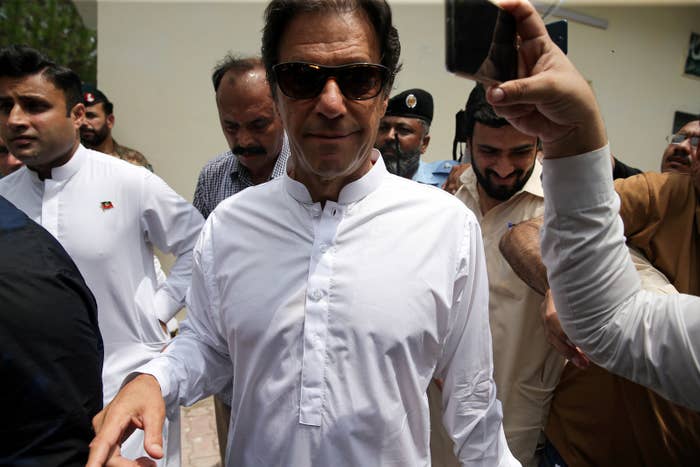
Imran Khan, the onetime cricket player and international playboy, was formally nominated by his political party on Monday to be Pakistan’s next prime minister — a selection that has many worried about his history of anti-American rhetoric.
Whether his ascension to the top political job in Pakistan, the world’s sixth most populous nation and a nuclear-armed power, will be a plus or a minus for the United States remains disputed.
Some worry that Khan has, in the past, made statements against the United States and in support of the Taliban. He has repeatedly argued in favor of talking with the Taliban.
Others, however, see his approach as potentially helpful in Afghanistan. If the Trump administration’s current plan is to hold peace talks, then Khan, who has advocated for negotiations with militant groups, could be useful in bringing them to the table.
“Rather than seeing Imran Khan as an antagonistic force or spoiler, I see his rise to power as fortuitous,” Arif Rafiq, an adjunct scholar with the Middle East Institute, told BuzzFeed News.
Still others insist that this debate — whether Khan will be good or bad in achieving US goals in Afghanistan — underscores the real problem in the US–Pakistan relationship.
“That’s our main complaint,” a Pakistani diplomat told BuzzFeed News. “Stop looking at us solely through the lens of Afghanistan.”
“I wouldn’t say there’s a Pakistan strategy itself,” Rafiq said. The United States, he said, “has what it calls a South Asia strategy, and that’s really a strategy that’s aimed at Afghanistan and achieving some sort of exit — an exit with honor from that country.”
Richard Olson, who was the US ambassador to Pakistan from 2012 to 2015, agrees. The essence of the policy, he said, is that “Pakistan should expel, arrest, or bring to the table the Afghan Taliban so that a political settlement [can be reached]. It’s a very Afghan-centric policy.”
And given that US–Pakistan and Pakistan–Afghanistan relations fall under foreign policy, some wonder whether Khan can do much at all.
“I don't think that Khan will be in the driver's seat with regards to Pakistan's role or leadership in U.S.-Afghanistan peace talks.” wrote Shamila Chaudhary, a senior fellow at New America, a think tank based in Washington, DC. The Pakistani military is involved in Pakistani foreign policy, and especially in the case of Afghanistan. The military wants a government in Kabul more sympathetic to Pakistan than to its regional rival, India.
“The only way a wrench will be thrown into peace talks is if the military does it — or gives its blessing for the civilians to do so,” she said.
Even the Pakistani official said Khan is more interested in domestic than foreign policy issues, and may well leave the latter to whomever he appoints as foreign minister.
But here, too, is another possible problem, one that involves a relationship bigger than Khan. Khan’s domestic program requires money, which means Khan needs money for Pakistan.
In return for support of the war on terror following the Sept. 11, 2001, attacks, Pakistan received billions in aid, and US sanctions against Pakistan were lifted. Under George W. Bush’s tenure, Pakistan became a non-NATO ally, able to buy US military equipment.
But earlier this year, the Trump administration froze more than $1 billion in security aid earlier this year (a State Department spokesperson said it would not comment on whether the funds would remain frozen for the foreseeable future); last week, Congress slashed aid provided to Pakistan through the National Defense Authorization Act by more than 75%. And, last Monday, after touting his vision for America’s Indo-Pacific Strategy, widely seen as an American attempt to counter Chinese influence in the region, Secretary of State Mike Pompeo warned that a potential bailout from the International Monetary Fund to Pakistan should not be used to pay off Chinese lenders. (The Pakistani official said their stance is that it is unfair for the United States to link the two, but that they understand that this is consistent with great power rivalry.)
“We understand that Pakistan has not requested assistance from the IMF. If they do request assistance, the principles expressed by the secretary are clear. The United States will, as it does in every case, examine closely all aspects of any loan program,” the State Department spokesperson said.
Would an unfavorable decision by the IMF push Pakistan closer to China?
“China cannot replace the United States because it assumes different kinds of engagement in Pakistan,” wrote Chaudhary. “New kinds of American pressure can, however, push Pakistan into considering new asks of its old partners, whether it be China, Saudi Arabia, or the Gulf countries.”
But this, too, is more about another country than it is about Pakistan, said Rafiq. “I see [Pompeo’s comments] as targeted toward China, but Pakistan is bearing the externalities,” he said.

